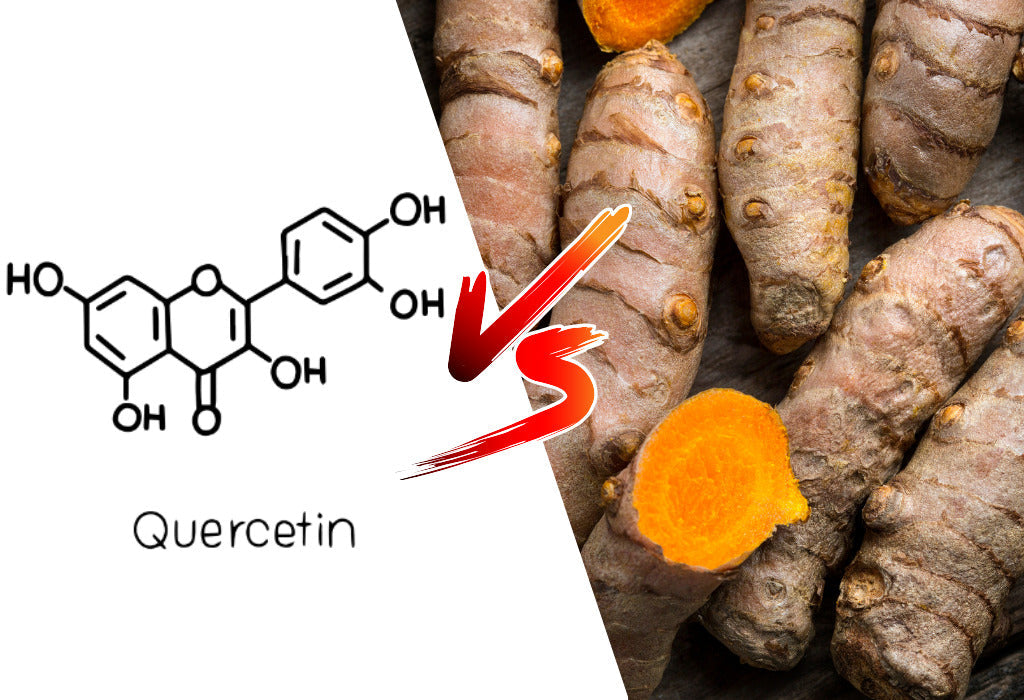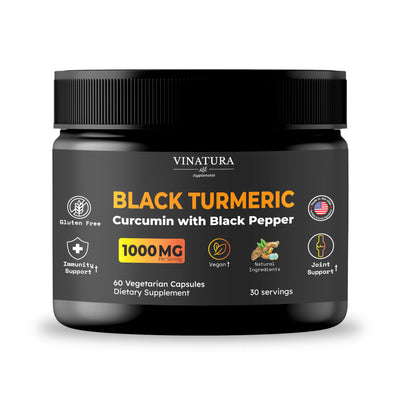
Quercetin Vs Berberine: Which Is Better For Antioxidant Properties?
With the abundance of supplements currently on the market, quercetin and berberine stand out due to their powerful antioxidant properties. But which of these two is better for the body? This article will provide an in-depth comparison of quercetin and berberine in terms of antioxidant effects, benefits, side effects, and the potential of combining them to achieve optimal results for the body.
Before exploring further, please read the disclaimer located at the end of this webpage.
Key Takeaways
- Berberine is an antioxidant known for its potential to reduce oxidative stress, improve digestion, support blood sugar regulation, and promote heart health.
- Quercetin stands out for its strong anti-inflammatory properties and its ability to enhance the immune system.
- Both substances can be combined under the guidance of a healthcare professional.
- Research has shown that both have potential in cancer treatment.
About Berberine
What Is Berberine?
Berberine is a natural compound found in various plants native to India and China. It has a long history of use in traditional Chinese medicine, primarily for treating digestive issues, improving heart health, and acting as a powerful antioxidant.
Berberine Benefits
A study has shown that berberine has remarkable health benefits, including [1]:
- Reducing oxidative stress: Berberine decreases markers of damage and oxidative stress caused by free radicals, significantly reducing inflammation, especially in the liver.
- Improving digestion: Berberine supports a balanced gut environment, particularly Lactobacilli, while promoting beneficial bacteria.
- Supporting blood sugar regulation: It has been shown to lower blood sugar levels, supporting healthy blood sugar levels.
- Enhancing heart health: Berberine helps reduce bad cholesterol and triglycerides, thereby lowering the risk of cardiovascular disease.
About Quercetin
What Is Quercetin?

Quercetin is a type of flavonoid plant compound commonly found in various fruits, vegetables, and seeds. Specifically, rich sources of quercetin include onions, grapes, apples, and berries. Quercetin has gained significant popularity due to its strong antioxidant and anti-inflammatory properties that benefit users' health.
Quercetin Benefits
According to the latest research in 2023, quercetin has potential health benefits, including [2]:
- Powerful antioxidant: Quercetin can eliminate free radicals, reduce oxidative stress, and protect cells from damage, thereby reducing cellular degeneration and maintaining cellular health.
- Antibacterial and antiviral properties: Quercetin has strong antibacterial and antiviral effects, helping to reduce their growth, which supports the immune system and reduces the risk of infections.
- Anti-inflammatory: This compound also has the ability to inhibit the production of cytokines and enzymes.
Learn more: Berberine Vs. Turmeric: Similarities and Differences
Can You Combine Quercetin Vs Berberine?
Quercetin and berberine can be combined to provide complementary benefits, particularly to optimize their antioxidant and anti-inflammatory effects and improve cancer conditions [5]. However, when combining these compounds, it is essential to pay attention to dosage, method of use, and individual health conditions to avoid potential side effects from improper use.
The Bioavailability And Absorption Of Berberine And Quercetin
Bioavailability is an important issue when using both berberine and quercetin, as both compounds have poor absorption in the body when taken in their natural forms. Therefore, to enhance their absorption, they are often combined with ingredients that can improve bioavailability, such as piperine (extracted from black pepper).
The Antioxidant Benefits Of Quercetin Vs Berberine
As mentioned above, both quercetin and berberine have powerful antioxidant effects, but you can easily recognize that their mechanisms of action differ as follows:
- Quercetin: Works by inhibiting the formation of free radicals.
- Berberine: Helps reduce inflammation and improve cellular health through blood sugar regulation and cholesterol control.
Quercetin Vs Berberine In Cancer Care

Both quercetin and berberine have the potential to support cancer treatment due to their antioxidant and anti-inflammatory properties. Quercetin may slow the growth of cancer cells by inhibiting enzymes that promote cancer cell growth. Meanwhile, berberine supports overall cellular function and metastasis.
Research And Scientific Evidence Of Quercetin Vs Berberine Cancer Treatment
Quercetin: Research shows that quercetin can regulate the MEK/ERK and Nrf2/Keap1 signaling pathways, helping to reduce inflammation and cancer development. Additionally, quercetin has demonstrated the ability to reduce colorectal cancer and reduce the risk of lung cancer in epidemiological studies [3].
Berberine: This compound can inhibit cell growth and induce apoptosis in cancer cells. As a result, derivatives of berberine have been developed to enhance its efficacy and selectivity. Various studies on human cancer cell lines have also shown that berberine derivatives have the potential to become promising cancer treatment therapies [4].
Learn more: Berberine Vs. Metformin: Which Is Better For You?
Quercetin And Berberine Side Effects
Quercetin and berberine are safe when taken in the appropriate dosage and aligned with your health condition. However, exceeding the recommended dosage may lead to the following issues:
- Quercetin: Indigestion, nausea, and mild allergic reactions in some individuals.
- Berberine: Stomach pain, diarrhea, and excessive hypoglycemia.
Conclusion
As powerful antioxidants, both quercetin and berberine offer potential health benefits. If you are looking for a compound that supports immune function and has anti-inflammatory effects, quercetin would be a great choice. However, if you want to further support heart health and blood sugar regulation, berberine would be an excellent option for you.
References
- [1] Berberine – a novel approach to cholesterol lowering KONG W, WEI J, ABIDI P et al.: Berberine is a novel cholesterol-lowering drug working through a unique mechanism distinct from statins. Nat. Med. (2005) 12:1344-1351.
- [2] Recent Advances in Potential Health Benefits of Quercetin Pharmaceuticals 2023, 16(7), 1020; https://doi.org/10.3390/ph16071020 Submission received: 15 June 2023 / Revised: 8 July 2023 / Accepted: 13 July 2023 / Published: 18 July 2023
- [3] Multitargeted cancer prevention by quercetin Cancer Letters Volume 269, Issue 2, 8 October 2008, Pages 315-325 https://doi.org/10.1016/j.canlet.2008.03.046
- [4] Berberine, an Epiphany Against Cancer Molecules 2014, 19(8), 12349-12367; https://doi.org/10.3390/molecules190812349 Submission received: 27 June 2014 / Revised: 6 August 2014 / Accepted: 11 August 2014 / Published: 15 August 2014
- [5] In vitro anticancer efficacy of a polyphenolic combination of Quercetin, Curcumin, and Berberine in triple negative breast cancer (TNBC) cells https://doi.org/10.1016/j.phyplu.2022.100265
Author

Product Disclaimer
Including an ingredient or study does not evaluate, endorse, or recommend any Vinatura product or any third-party product. Some ingredients discussed may not be used in any Vinatura product.
The content of the articles has not been evaluated by the Food and Drug Administration (FDA) and is not intended to promote or endorse any specific product. Any products sold on this website are not intended to diagnose, treat, cure, or prevent any disease.
Opinions and Endorsements
Any claims, statements, or opinions expressed in the articles are those of the author(s) and do not necessarily reflect the views or opinions of the manufacturers of the dietary supplement products. The products sold on this website are separate from the content of the articles and are not directly endorsed or associated with the information presented here.
Liability Disclaimer
The author(s) of the articles, website, and manufacturers of the dietary supplement products do not assume any liability for any potential consequences arising from the use of the information provided in the articles. Ingredient effects, dosages, and safety vary by individual, formulation, and context; some ingredients interact with medications or may be unsuitable during pregnancy or lactation. It is recommended that individuals consult with a qualified healthcare professional before making any dietary or lifestyle changes, including the use of dietary supplements.
Product Usage
Please refer to the product labels and packaging for specific usage instructions and guidelines for the dietary supplement products sold on this website.
Customer Support
For any concerns or questions regarding the dietary supplement products, please contact our customer support team, who will be more than happy to assist you.





Leave a Comment
Be the first to comment.
What do you think?